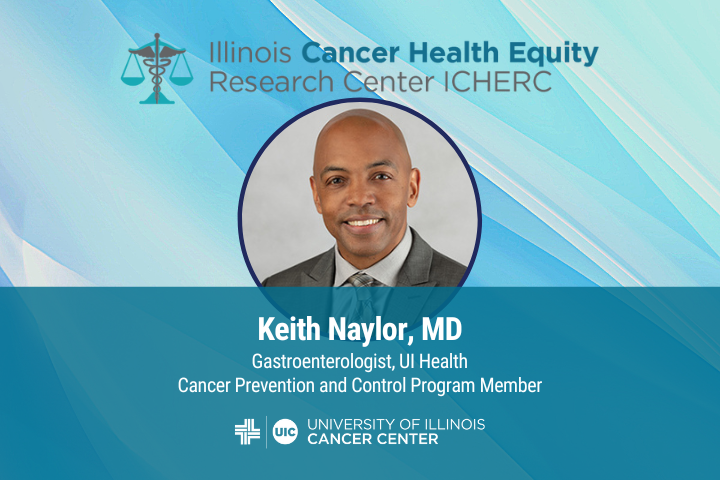
Having a family history of colorectal cancer increases your personal risk of developing colon cancer, and knowing your family history helps physicians decide when to recommend screening and with which test, all decisions that could save your life.
But what if you don’t know your family medical history because it’s something your relatives didn’t talk about or because you are adopted, estranged, separated or emigrated away from your family?
University of Illinois Cancer Center member Keith Naylor, MD, a UI Health gastroenterologist, is leading a research project that seeks to improve cancer risk assessment and colorectal cancer screening among underserved populations through enhanced family history documentation.
In practice, Naylor said it’s not uncommon for a patient who reports not knowing their family history of cancer to be recorded in the medical record as having “no family history,” which is different.
“We really don’t know what our unknowns are,” said Naylor, the Principal Investigator on a Research Scholar Grant funded through the Illinois Cancer Health Equity Research (I-CHER) Center, which sits within the Cancer Center and is made possible with funding from the American Cancer Society (ACS) and support from the Cancer Center.
In Illinois, colorectal cancer is the fourth leading cause of cancer deaths in the state, with rates of new cases and deaths highest in Black populations, according to the Illinois Department of Public Health’s 2022-2027 Illinois Comprehensive Cancer Control Plan.
Naylor’s Colorectal Cancer Research
Because March is Colorectal Cancer Awareness Month, the project Naylor leads will begin surveying patients this month by telephone (both in English and Spanish) on how much they know about their family history of cancer, specifically colorectal cancer, and how confident they are in that knowledge.
The project aims to survey 100 people who had an order placed at UI Health for stool-based colorectal cancer screening, which is only recommended for patients in the lowest risk group with no known family history of colorectal cancer, and 100 patients who had an order placed for colonoscopy. The survey takes about 15 to 20 minutes and includes no identifying information about personal health history.
The second phase of the study, which hasn’t started yet, will focus on health providers and the barriers they face in talking to patients about their family cancer history and the barriers to documenting family cancer history information in the electronic health record.
From Naylor’s experience caring for patients, unfortunately, some do not learn of their family history of colorectal cancer until after they are diagnosed with colorectal cancer themselves.
Ultimately, Naylor, who is part of the Cancer Center’s Cancer Prevention and Control research program, said results of the research project could result in improvements to how family history is documented in medical records and more tailored screening recommendations for colorectal cancer.
Funding Cancer Research
Naylor’s project is one of six subawards funded by the I-CHER Center. The I-CHER Center on the University of Illinois Chicago campus was 1 of 4 four Minority Serving Institutions that shared in more than $16 million in grants awarded by the ACS, beginning in January 2022, to establish Cancer Health Equity Research (CHER) Centers. The others were the University of Arizona, Morehouse School of Medicine in Atlanta, and Howard University in Washington, D.C. Each institution received a four-year grant of $4.08 million.
If you are interested in participating, please contact study research coordinator Monet Jones at [email protected].
